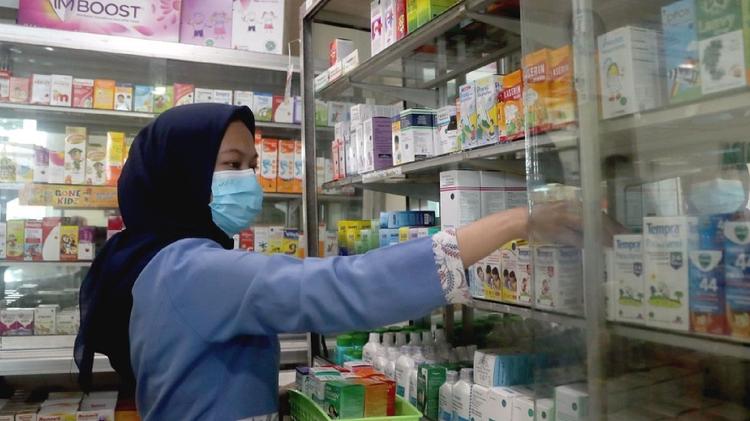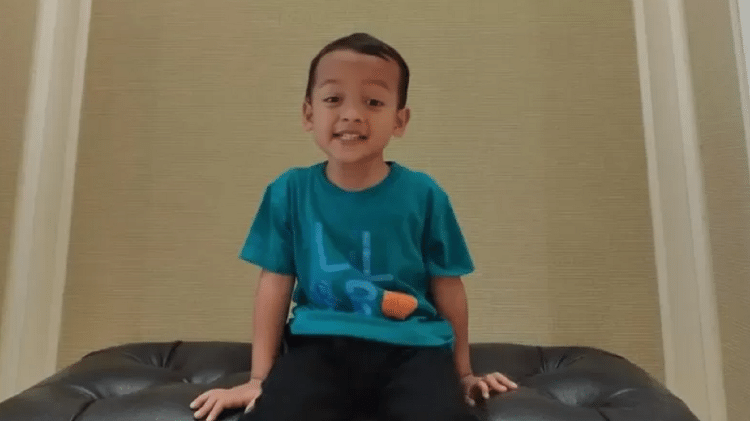When 17-month-old Nadira got the flu, her mother, Agustina Maulani, bought paracetamol cough syrup from a health center in Indonesia’s capital, Jakarta.
“Since his fever didn’t go down, I gave him the medicine every four hours. He would get better, but then he would have a fever again. He finally stopped urinating,” she told the BBC.
Rare was hospitalized, but did not recover. Lab tests showed excess levels of urea and creatinine, which are waste products that build up after the kidneys stop working. He fell into a coma and died.
“He died quickly in the end. He’s in really terrible pain,” Agustina cries.
Indonesia is facing a horrific wave of deaths: at least 157 children have died this year from acute kidney failure and other complications believed to be caused by contaminated drugs. Almost all of them were under the age of five.
Rare died in August. In October, Indonesian officials said he was part of a group of children who died of unexplained kidney problems.
The government later banned the sale of all liquid medicines. He later limited the ban to about 100 questionable products found in the homes of children who fell ill.
Pharmacies across the country have removed syrups from their shelves and advised parents to crush the pills if their child needs medicine.
Indonesian Health Minister Budi Gunadi Sadikin said that residues of ethylene glycol, diethylene glycol and butyl ethylene glycol, which are thought to be harmful, were found in the victims.
Diethylene glycol and ethylene glycol are commonly used in antifreeze solutions for air conditioners, refrigerators, and freezers, and as a solvent in very low concentrations for many products, including cosmetics. The World Health Organization (WHO) says it is never used in medicines.
“(acute kidney failure) has been confirmed to be caused by (these) substances,” the minister said.
The cases came weeks after the deaths of nearly 70 children in The Gambia. The World Health Organization said it found “unacceptable amounts” of diethylene glycol and ethylene glycol in four Indian-made cough syrups found in The Gambia.
Nothing indicates that the two scandals are linked. Indian authorities and manufacturer Maiden Pharmaceuticals say the four syrups are only exported to The Gambia. Indonesia claims that syrups made in India are not locally available.
Last Monday, Indonesia’s food and drug regulator, BPOM, announced that it will investigate two pharmaceutical companies that have recently changed suppliers of some ingredients from drug suppliers to chemical suppliers.
“There are indications on your products… [de substâncias] “These are extremely extreme, highly toxic and suspected of causing kidney failure,” BPOM chief Penny Lukito said at a news conference.
Meanwhile, dozens of sick children are being treated for acute kidney failure and have requested a rare antidote – fomepizole – to treat them from Indonesia, Singapore and Australia.
The tragedy shocked Indonesia. Last week, the country’s ombudsman criticized the Ministry of Health and the BPOM, saying it did not adequately test products on sale to ensure they meet set standards.
In an angry editorial, the Jakarta Post claimed that the BPOM had delegated responsibility for testing to the pharmaceutical companies themselves – a “terrible” finding that the government had “relinquished its mandate”.
“While our hearts are devastated as parents continue to lose their precious children, we are now discovering massive neglect and lack of government oversight,” the newspaper said.
Eric Chan, a professor at the National University of Singapore, told the BBC he was stunned to learn that such deaths continue to occur, describing the events in Indonesia as a “human disaster”.
Diethylene glycol was used in the past to make medicines sweeter — but it’s now known to be toxic, he said.
When diethylene glycol is metabolized in the body, it forms diglycolic acid, which damages kidney cells – which can be fatal if not treated in a timely manner, she adds. A decrease in urine is an early sign of kidney poisoning.
Chan also notes that the reporting of cases across Indonesia indicates that a pharmaceutical company with extensive distribution networks is involved.
He says medical staff at local hospitals may not be accustomed to dealing with drug-induced poisoning, given the fact that many children are taken from hospital to hospital seeking treatment.
“We must bear in mind that the death toll may still rise,” he warned.
In Bekasi, east of Jakarta, Siti Suhardiyati had to remove her son’s toys.
Omar Abu Bakr was two years old when he died on September 24. He was also diagnosed with kidney failure by doctors at his last hospital in Jakarta.
Just two weeks ago he had a fever and a cold. He also had diarrhea, so Siti took him to a local clinic.
The family was given three types of medication, including acetaminophen syrup. Three days later, Ömer stopped urinating.
“I usually change her diaper in the morning because it’s full, but this time there was nothing,” she recalls.
He was taken to a local hospital for treatment before being taken to Cipto Mangunjusomo Hospital in the capital. But it’s too late.
“How dangerous could there be in this cough syrup? If it’s really BPOM-approved, it should have been tested,” says Suhardiyati.
Nadira’s mother, Maulani, is also looking for answers.
“If this is negligence… we demand that the cases that hit our children be held to account,” he says.
– This text was published at https://www.bbc.com/portuguese/internacional-63456432.
source: Noticias

